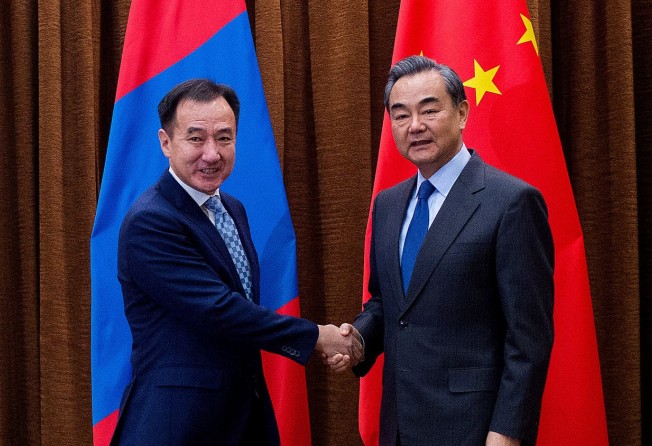China says resurfacing tensions on Korean peninsula regrettable
After failing to mediate in Pyongyang, Beijing now likely to focus on crisis management, expert says

After two months of relative calm, the resurfacing of tensions on the Korean peninsula was regrettable, China’s Foreign Minister Wang Yi said on Monday.
Speaking at a joint briefing with his Mongolian counterpart Damdin Tsogtbaatar, who was on a visit to Beijing, Wang’s public display of frustration came in response to Pyongyang conducting its latest missile test just days after China had sent an envoy to the reclusive country. It also coincided with the largest ever drill held between the United States and South Korea.
“After two months of relative quiet, tensions on the Korean Peninsula have increased again. It is a regret the parties involved failed to seize the opportunity despite China’s appeals,” he said.
“China has always been open-minded to new propositions to resolve the issue, however, the stipulations and spirit of UN Security Council resolutions should be a common principle for all parties to follow,” Wang said, adding that the resolutions represented the common will of the international community.
Wang Sheng, a specialist in North Korean affairs at northeastern China’s Jilin University, said that after failing to successfully mediate in Pyongyang, Beijing was likely to focus its attention on crisis management on the Korean peninsula.
“China is now in a very tricky position as its call for negotiation was rejected by both North Korea and the US,” he said.
“Beijing will shift focus from negotiation to crisis management in the coming days, which includes stricter border security controls, testing for nuclear radiation and managing refugee problems.”
That said, China would not cut diplomatic ties or close its oil pipelines with North Korea as maintaining a stable North Korea was still in its best interests, Wang Sheng said.
In a bid to repair ties between the neighbour countries, Chinese President Xi Jinping’s special envoy Song Tao last month spent four days in North Korea. However, there were no reports from China’s state media of him meeting Kim Jong-un, suggesting that relations between the communist nations remain strained.
US President Donald Trump was quick to have his say on Song’s apparent lack of success.
“The Chinese envoy, who just returned from North Korea, seems to have had no impact on Little Rocket Man,” he said on Twitter on Thursday, a day after speaking with President Xi.
Zhang Tuosheng, director of the Centre for Foreign Policy Studies at the China Foundation for International and Strategic Studies, said that while Beijing was unlikely to give up on its efforts to bring relevant parties to the negotiating table, making preparations for dealing with North Korea as a nuclear state was now urgent.
“Various scenarios require Beijing to be prepared, such as whether a nuclear North Korea would trigger a new round of the global arms race, or the collapse of the treaty on the non-proliferation of nuclear weapons, or a humanitarian crisis in North Korea should the US wage war against the Kim regime,” Zhang said.
Tsogtbaatar’s visit to China was the first by a high-level official since Mongolia formed a new government in July. Ulan Bator recently joined the international community in sanctioning North Korea, saying it would no longer renew visas for North Koreans working in the country when they expire at the end of the year.
The move will have a major financial impact on Pyongyang as the wages of thousands of North Koreans working in Mongolia help support the country’s nuclear programme. According to a Reuters report published on Sunday, there were 2,123 North Koreans working in Mongolia in 2013, although that figure has been falling.